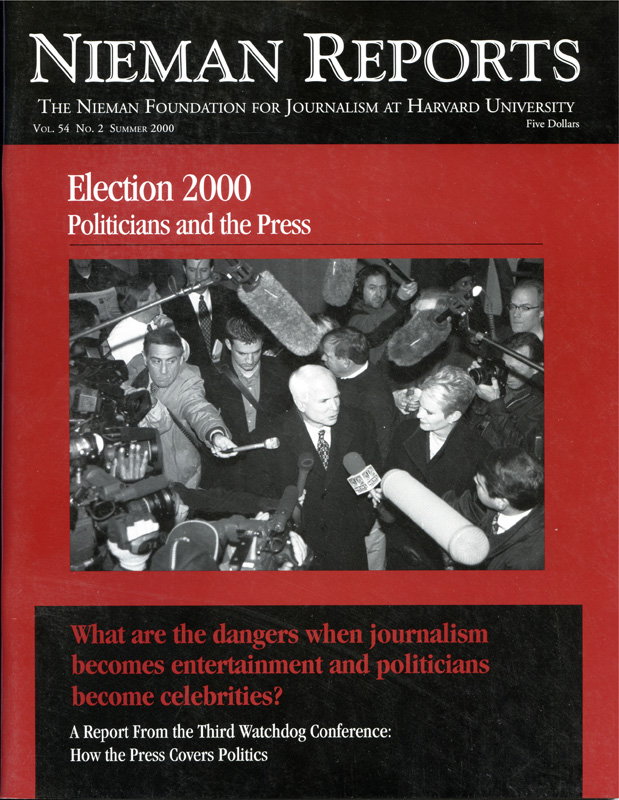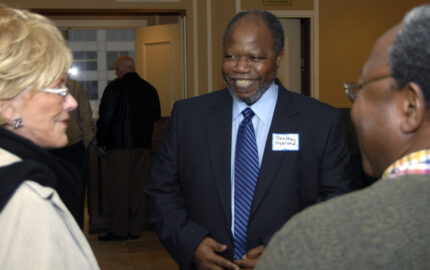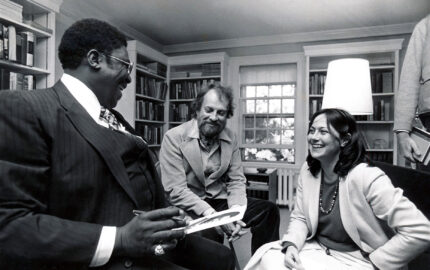Bill Kovach received the Goldsmith Career Award for Excellence in Journalism from the John F. Kennedy School of Government at Harvard University March 9, 2000. Here are excerpts from his speech.
Let me begin with full disclosure. The truth is, if my career deserves this award, I can’t accept it as mine alone. I am surrounded here by ghosts who have directed and shaped my career—often against my own stubborn resistance.…
What all these [ghosts] and others helped me understand is the obligation each journalist assumes when choosing a life as public witness, which is what one does when one chooses to become a journalist.… In the past few decades this responsibility of the journalist in a free society became both more vital and more difficult. The journalist today is engaged in a struggle to clarify and maintain the principles that assure the integrity and reliability the public deserves.…
In 1979, when I became chief of the Washington bureau of The New York Times, we had no personal computers, no fax machines, no cellular phones, and the Internet was an instrument of the Cold War called ARPANET used exclusively by the military-industrial-scientific community.
All of that and more is now part of a revolution which, as an agent of change, has had few equals in its impact on…the world.… The impact on journalism has been at least as disorienting. The most obvious impact has resulted from two fundamental changes:
First, the mixing of media by digital technology, which merges all forms of communications—voice, pictures and print—on the World Wide Web, which creates new platforms to attract readers and advertisers.
Second, the fragmentation of the means of production and the choices available means anyone anywhere is a potential competitor to traditional news organizations. Anyone anywhere is a potential customer. As a result, journalism appears in an atmosphere that erases the boundaries between advertising and editorial, in which it is difficult to distinguish journalism from commerce or to recognize the value of journalism among all the other information pumping through the system.
Recent polls in the United States which show a public increasingly frustrated and alienated by “the news media” have made this point with depressing force.… The reason for this loss of confidence in the press…is that the public can no longer distinguish between a journalist attempting to produce a disinterested, balanced presentation from a self-serving political line or tabloid sleaze.…
This confusion is aided and abetted by the economic organization of the news industry in response to the development of the new communications technology.
The logic of the new marketplace is drawing journalism into a horizontal organization of communications conglomerates that exploit talent across media, making no distinction between the values which inform journalism and entertainment and commerce. And also into a vertical reorganization which brings together corporations with vastly different cultures, goals and values…to ingest entire news organizations which become divisions with a diminished role in the decisions of a company.
These emerging mega-corporations which include journalism divisions threaten to make the whole notion of conflict of interest by journalists an antiquated idea.… We must all question whether we can rely on a handful of behemoth corporations to monitor themselves—or the other centers of power with which they do business.
[S]lowly…journalists are beginning to react. Nearly three years ago now, a group of 24 journalists met here at Harvard at the invitation of the Nieman Foundation to organize the Committee of Concerned Journalists. The organization has [since] engaged some 3,000 people in public forums to examine, articulate and promote standards of journalism and independence from self-interest communication and from commercial exploitation—an independence which would regain public trust and justify the continued protection provided in the First Amendment.
In a statement of shared purpose the Committee has circulated, here is what these journalists say defines their work: “The central purpose of journalism is to provide citizens with accurate and reliable information they need to function in a free society.”
Over time journalists have developed the following nine core principles to fulfill that purpose:
Obligation to the truth;
Serve public interest first;
Monitor the powerful and offer voice to the voiceless;
Provide a forum for comment, criticism and compromise;
Employ an ethical method of verification;
Maintain independence from faction;
Make news engaging and relevant;
Keep news comprehensive and proportional,
Remain true to personal conscience.
To the extent journalists themselves can articulate, practice and defend these principles, and to the extent the public supports these principles and considers them important—to that extent only can the concept of independent journalism in the public interest…safely migrate onto the new web of instantaneous, interactive, multimedia communications spinning out around the world.



